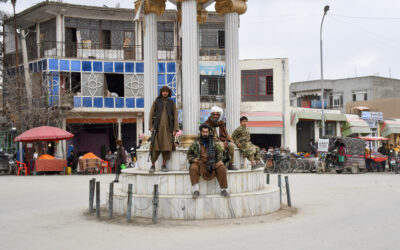Cipher Brief Expert Mike Leiter served in several senior national security positions in the federal government, to include as the Director of the National Counterterrorism Center (NCTC) from 2007 until 2011 for both Presidents Bush and Obama. This piece was first published by The Washington Post and was published here with permission from the author.
EXPERT PERSPECTIVE — One narrative emerging out of the tragedy in Afghanistan is both wrong and potentially counterproductive: the conclusion that our withdrawal represents a return to a pre-9/11 situation that puts us at risk in the same way that led to the deaths of almost 3,000 Americans 20 years ago.
Little if anything about Afghanistan has turned out as the United States had hoped when our military engagement began. But purely from a counterterrorism perspective, the United States and our allies have made incredible strides since 9/11 — in Afghanistan and beyond — that make us vastly safer than we were the last time the Taliban ruled Afghanistan. Moreover, the global Sunni violent extremist movement, while far from eradicated, has been weakened in important ways over two decades.
As a result, although the Taliban’s victory is a blow, we must guard against a response that is skewed by an un-nuanced, dated view of the terrorism threats we actually face in this new environment.
When al-Qaeda launched its horrific attacks in September 2001, it operated with near complete impunity in Afghanistan. Although the Taliban and al-Qaeda were not operationally linked, the protection and haven that al-Qaeda enjoyed allowed it to recruit and train operatives and deploy them around the globe. At the same time, the United States and its allies were poorly positioned to address such threats. Both individually and as a coordinated team, the U.S. counterterrorism community was unable to muster the resources, capabilities and focus to stop a relatively small group of committed plotters.
Two decades later, this picture is dramatically improved. The individual elements of the U.S. counterterrorism community are likely the most integrated part of the entire U.S. government. Add to this the global nature of allied counterterrorism efforts, and the result is a significant, worldwide network of allies that share information and coordinate operations in a manner wholly different than in 2001.
The return of a potential al-Qaeda or Islamic State haven in Afghanistan poses a clear challenge to Western counterterrorism capabilities, but it presents a significantly less threatening problem than was once the case. The lack of a robust physical presence for U.S. intelligence and Special Operations forces in Afghanistan — as well as the absence of a moderately able and trustworthy local partner — removes key capabilities and, in turn, protections.
Go beyond the headlines with expert perspectives on today’s news with The Cipher Brief’s Daily Open-Source Podcast. Listen here or wherever you listen to podcasts.
Still, the U.S. ability to monitor and disrupt plotting in distant lands has never relied solely on such conditions, as has been readily apparent in Yemen and Somalia. Counterterrorism work will be more difficult, but it will be far more effective than it was the last time the Taliban controlled Afghanistan. Technical intelligence, innovative local partnerships and continued engagement with key local counterterrorism allies — as imperfect as these are in the region — provide a package of capabilities that can fill many gaps.
Meantime, the threat of Sunni violent extremism has diminished since 9/11. Thanks to U.S., Afghan and others’ efforts, al-Qaeda is a shell of its former self — one of the true successes of our years in Afghanistan. Of course, the Islamic State has partially filled the void, but even here the dynamic has changed significantly. Unlike pre-9/11, it is abundantly clear that the Taliban — for all of its evil — is at least for now aggressively anti-Islamic State in ways that it was never anti-al-Qaeda.
The Cipher Brief hosts private briefings with the world’s most experienced national and global security experts. Become a member today.
These counterterrorism gains are not isolated to Afghanistan. In fact, global terrorism related to Sunni violent extremism has been steadily declining across the globe, most notably in the United States and Western Europe, since 2014. This is attributable in part to the dismantling of the Islamic State in Syria and Iraq, but arguably it is also driven by the movement’s refocusing on the “near” versus the “far” enemy. Although the Islamic State and its adherents still aspire to strike in Western capitals, that is not nearly the priority it was in 2001.
Terrorism of many sorts continues domestically and internationally, but the data is unmistakable that in most cases — and especially in the United States — it is both manageable and not nearly of the scale feared in 2001.
Appreciating what has changed for the better since 9/11 is essential to avoid repeating some of the mistakes of the past two decades. We know that if U.S. national security priorities are overly dominated by terrorism fears, we will make poor and unachievable choices — such as trying to nation-build in ways that fail to appreciate local conditions and traditions, or adopting practices that endanger our moral standing and alienate key populations. In addition, we will squander scarce resources that are more necessary than ever to address pressing strategic challenges such as the rising global influence of China and enhancing cybersecurity.
The Taliban’s victory in Afghanistan is not good for the United States and our withdrawal has undoubtedly — at least for now — shaken some of our allies’ faith in us. It’s fine to regret what we failed to accomplish. We should also recognize what we did achieve — and ensure this informs our counterterrorism and broader national security policies moving forward.
This piece was first published by The Washington Post and was published here with permission from the author, who is a Cipher Brief Expert
Read also Why We Need a New National Defense Strategy exclusively in The Cipher Brief










